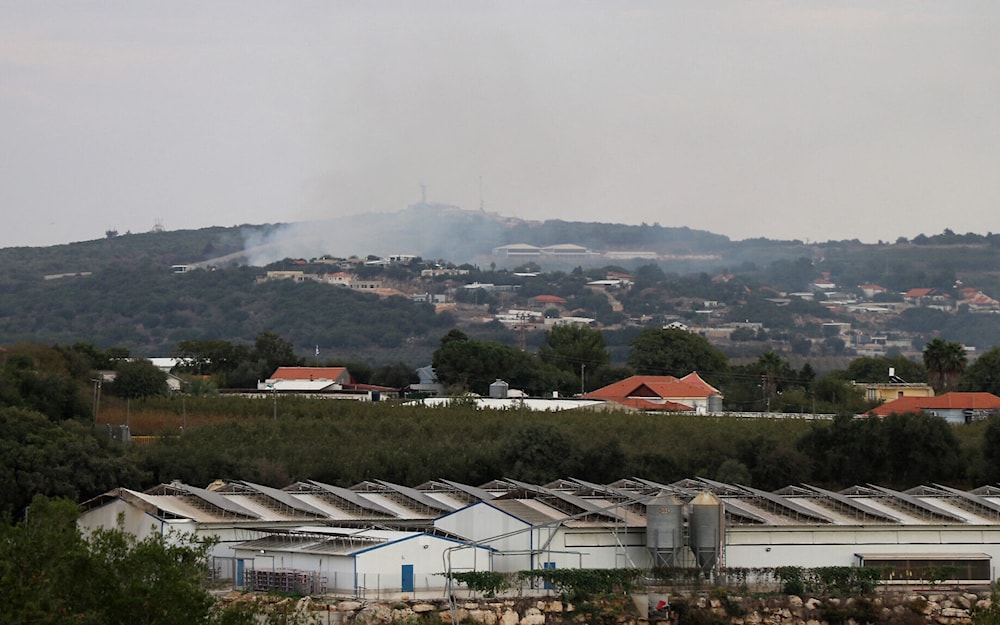War with Hezbollah would 'skyrocket' food prices: Israeli report
An Israeli food company says that consequences on the Israeli society would be severe if the north witnesses a military escalation.
-

Smoke billows from an settlement near the border with Lebanon following a Hezbollah rocket operation targeting an Israeli site on October 30, 2023 (AFP)
Israeli media reported on Tuesday that the occupation entity suffered a rise in food prices this year due to increased shipping costs, attributed to the growing Yemeni operations, concerns over maritime routes in the Red Sea, and Hezbollah's operations on the northern occupied Palestinian border.
However, these prices would soar even higher in the case that a war with Hezbollah would start, the outlet said.
Hezbollah has launched operations in support of Gaza since October 8, which saw hundreds of strikes against Israeli military bases and sites. This has prompted almost a quarter-million Israelis to evacuate northern settlements, which primarily serve as the entity's main poultry and agricultural production regions.
Nir Goldstein, the General Manager of the GFI Israel, a research institute dealing with alternative protein and food security, stated in an interview with the Israeli newspaper Israel Hayom that the Israeli production capacity has been significantly affected because "agriculture and poultry farming are concentrated at the northern borders."
Read more: Israeli economy, tech sector sustain massive fallouts amid war on Gaza
He added that "importers are hesitant to raise prices now for fear of criticism during wartime."
"If things escalate into a war with Hezbollah, there will be a shortage of eggs and poultry, and prices will skyrocket," Goldstein warned.
The institute's director also noted that "Israel" has three ports through which 98% of its food is imported.
Haifa port is currently facing threats from the north and serves as the main gateway for essential food imports, with 70% of goods passing through it. "Therefore, the consequences will be severe if the battle with Hezbollah intensifies."
Read more: Thousands of businesses in north closed since October 7: Israeli media
A report prepared by Israeli company Shaldor and published by GFI in December 2023 revealed that 84% of animal-based food supplies in "Israel" are at significant risk, not only due to imports but also because 26% of food items are exposed to very high risks, such as beef and fish, "in the scenario of a severe war, in the event of a front opening against Hezbollah."
Goldstein also points to the possibility of disruptions in maritime routes, especially those coming from the east. For example, 85% of cattle reach "Israel" by ships through the ports of "Eilat, Ashdod, and Haifa, and all these ports are threatened by enemies."
Hezbollah's impact goes beyond rocket range
A report by NPR last week detailed that the Israeli economy is enduring more difficulties now that tensions have worsened along the Lebanese border.
The NPR reports that, for instance, The Golan Heights Winery owners said that not only tourism and visitors have dwindled since the outbreak of the war, but daily operations have been disrupted as well.
Although Hezbollah rockets haven't reached the winery location yet, the economic toll is evident. CEO Assaf Ben Dov notes that the winery's production schedule has fallen behind due to staff shortages caused by reservists being called up for active duty.
Read more: 'Israel' 2024 revised budget deficit tripled from original forecast
Even more severely affected is the Galil Mountain Winery, situated in the settlement of "Kibbutz Yir'On", just a few hundred yards from the Lebanon border.
The winery has been shut down since October, with daily access requiring military permission. The vineyards, vital for wine production, are currently inaccessible, raising concerns about the impact on the upcoming season.

 4 Min Read
4 Min Read










